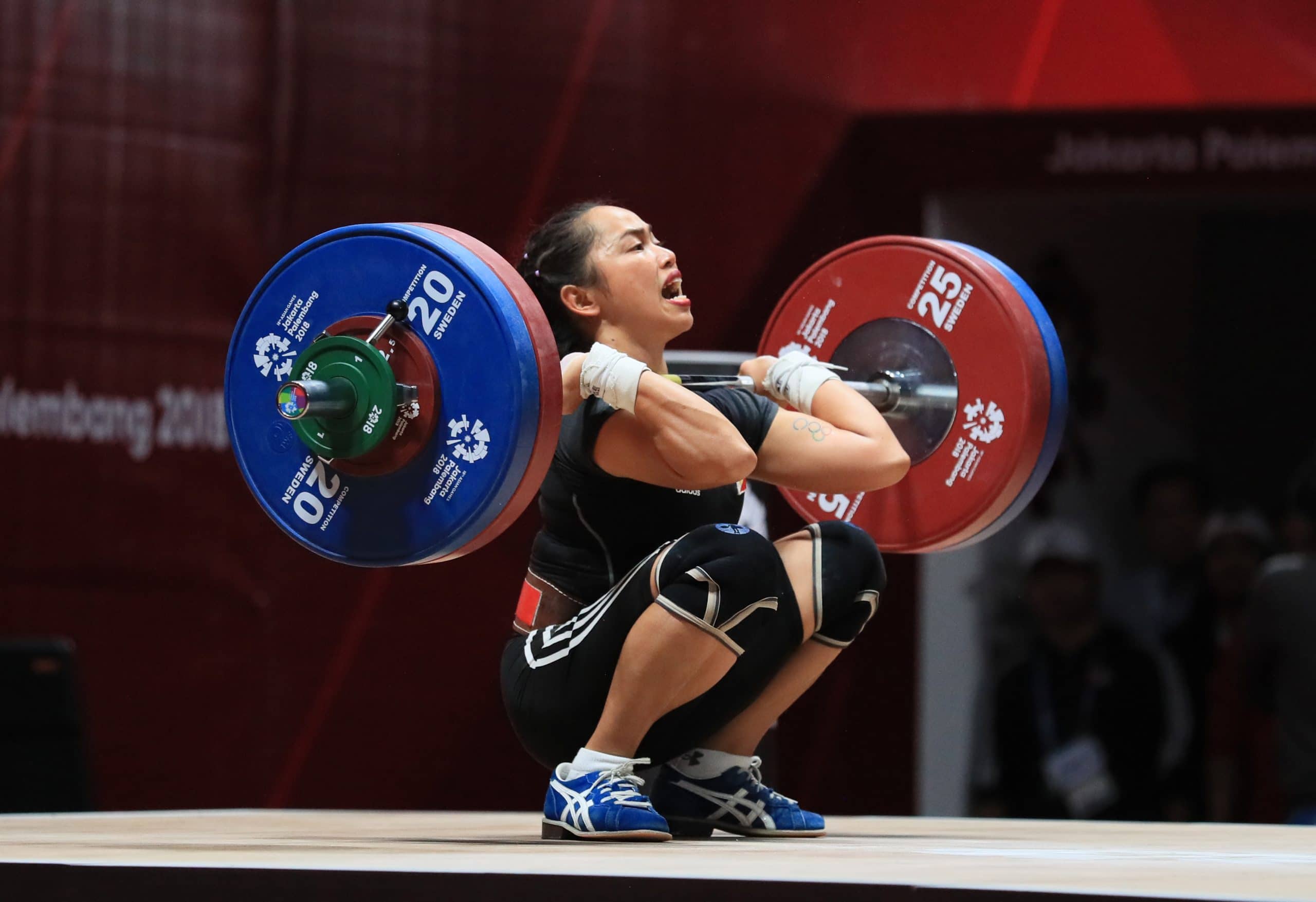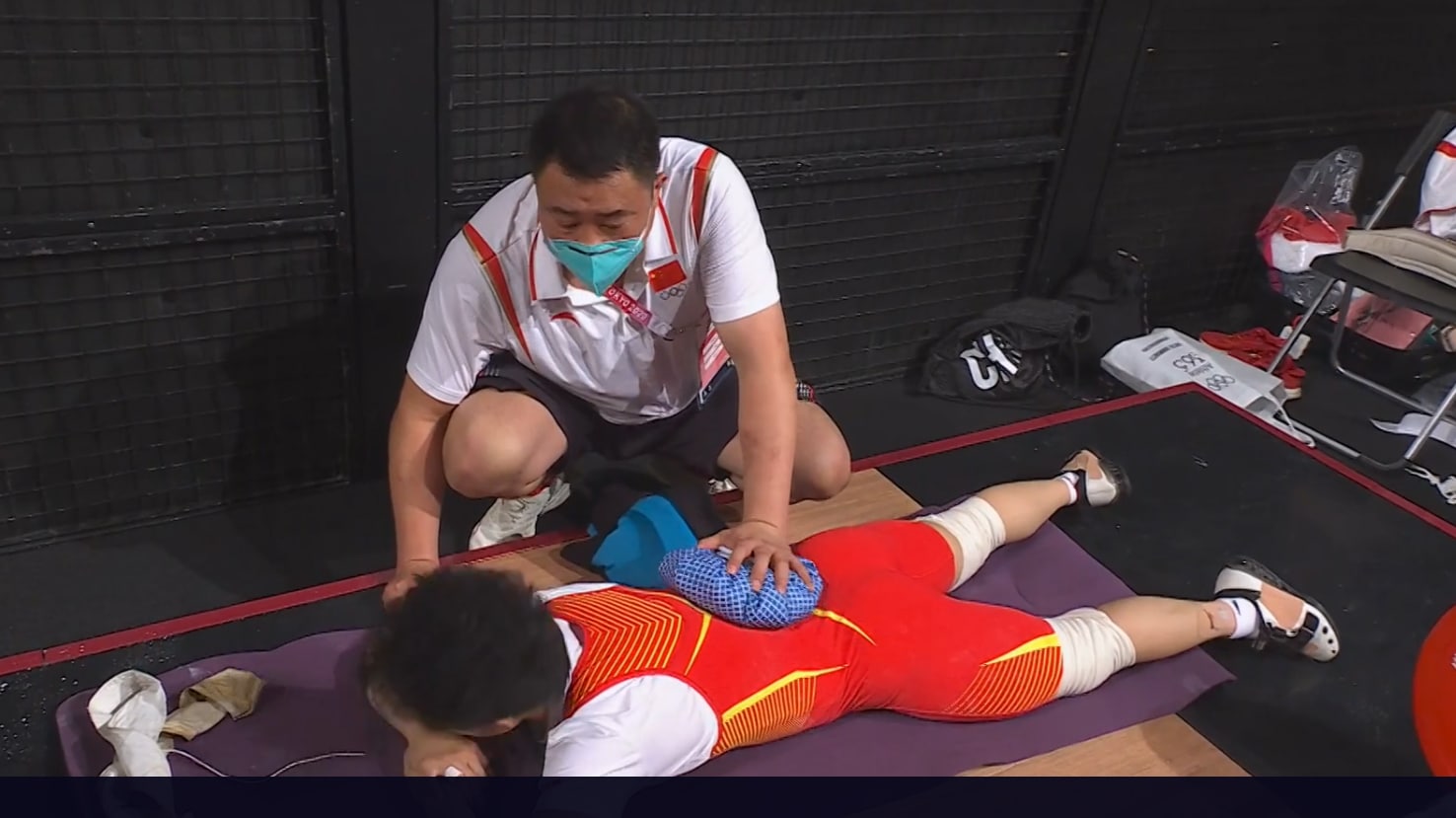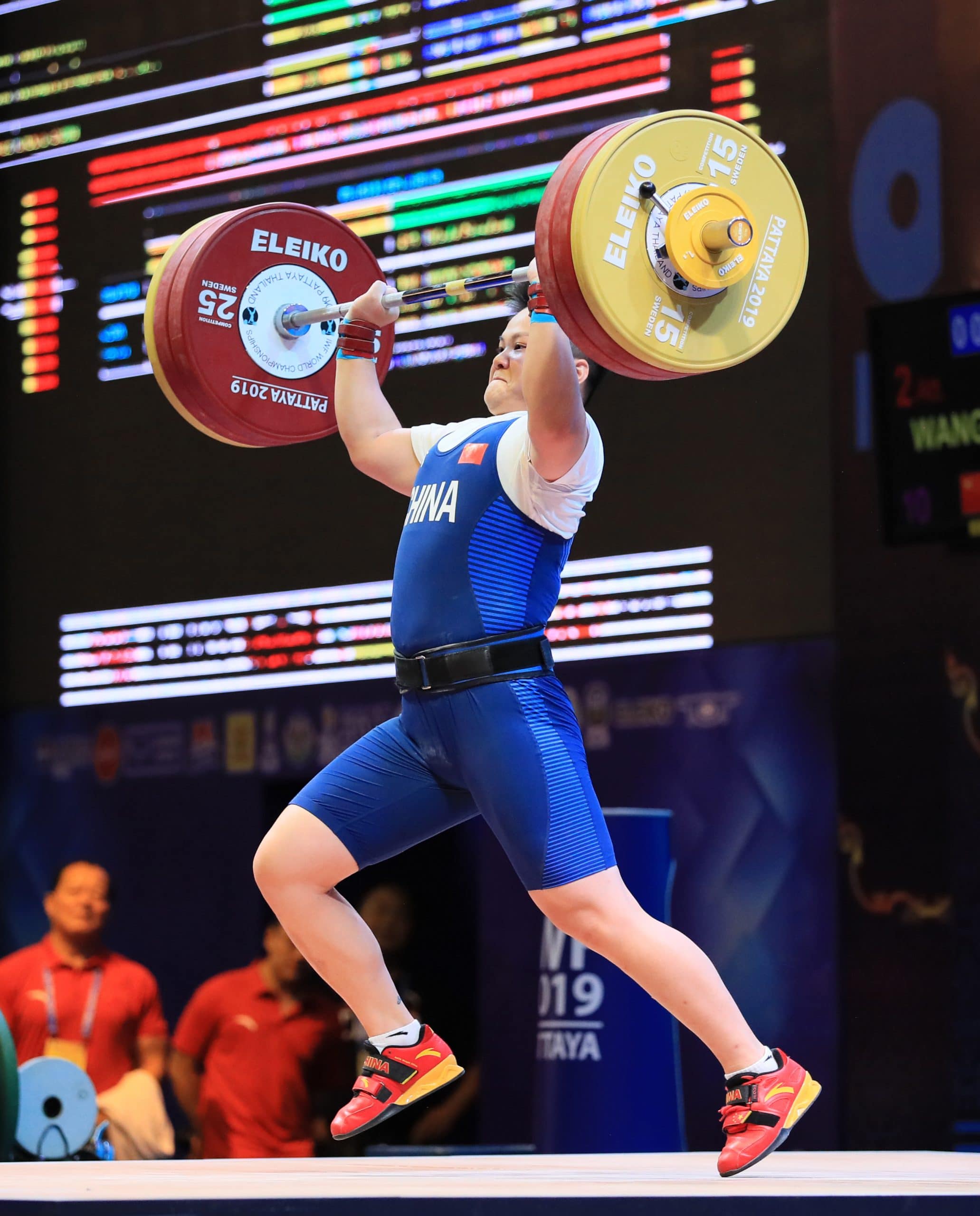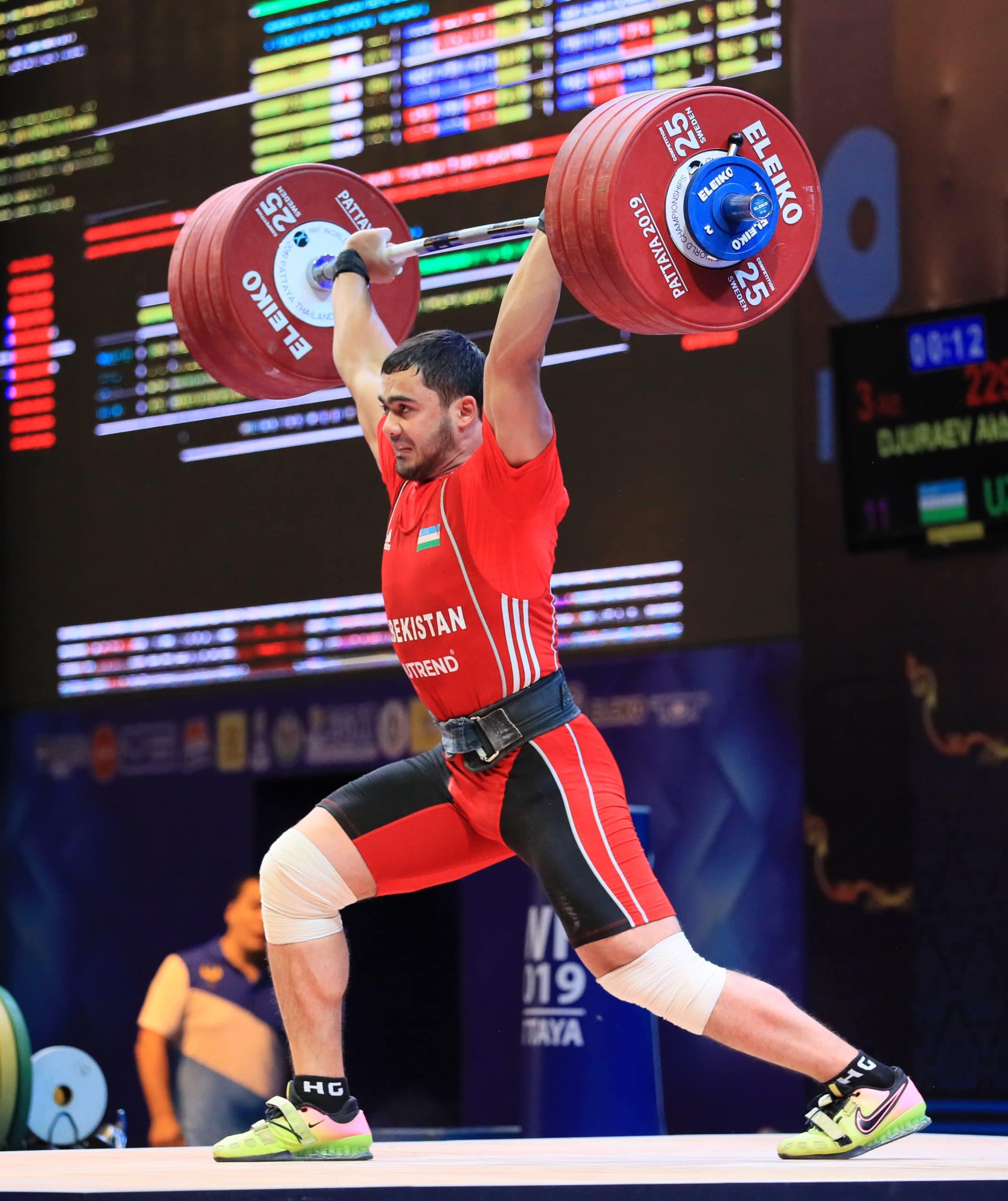Andrew Charniga
www.sportivnypress.com
The delayed for a year 2020 Olympics finally took place in Tokyo with an abbreviated field for various reasons. Unfortunately, some of the best lifters were unable to attend. DENG Wei (CHN) the single greatest female lifter of our times was left off team China because of injury. RIM Jong Sim (PKR) lost a shot at becoming the only three time female Olympic gold medalist when North Korea decided not to send a team to Tokyo for to fear of bringing covid 19 infection back to the PRK.
Figure 1. Hidilyn Diaz (PHI) defeat of Chinese LIAO Quiyun (CHN) was the highlight of the women’s competition. Charniga photo.
General observations
/ In the wake of the unconscionable number of lifts turned down at this competition; a ground swell of protest must occur to change the rules in weightlifting to eliminate the elbow flicker violation; if for no other reason to save the sport from sinking into oblivion. The press out rule blurs the difference and makes no distinction between locking the elbow joint and straightening the arms.
In most cases the officials have no muscle memory of what it is like to lift and secure a barbell overhead while at the same time trying to adhere to artificially contrived cosmetic constraints. No one should be allowed to officiate weightlifting at this level without undergoing some type of training simulating the difficulty of controlling and fixing an oscillating barbell;
/ with the exception of the ‘B’ sessions there were about twice as many officials as athletes per ‘A’ session;
/ under the current qualification system too many lifters who should be at the Games were left home;
/ bodyweight limits for the +87 kg are needed just as there are in other sports; too many poorly skilled obese lifters in this class gives the sport a negative image;
/ the selection of three heavier classes for women (76, 87 and +87 kg) for the games is a mistake: otherwise fit and skilled young women were forced to gain too much weight too quickly to weigh 87 or even 76 kg at the expense of skill and aesthetics;
/ with the world’s best female (DENG Wei (CHN) absent due to injury; and other Chinese with obvious back problems (see figure 1) such as TIAN Tao were absent due to injury; where were those functional training/core training experts who have been ‘helping’ the Chinese national team? (see 2021 Asian championships https://www.sportivnypress.com/2021/2021-asian-weightlifting-championships/
The Adderall Games
These games should go down in Olympic history as the ‘Adderall’ games. The event highlighted a trite euphemism. Two super elite females experienced coordination/proprioceptive difficulties; one a gymnast the other a tennis player. These difficulties brought to light; however, dimmed by the western media; the controversy surrounding the TUE (therapeutic use exemption) program. Under the guise of illness; athletes are permitted to use banned substances claiming this exemption/loophole. The gymnast pulled out of all but one final event; the tennis player who skipped two major tournaments was eliminated by a low ranked player.
The hypocrisy of the TUE exemption was exposed some years ago by the Russian hackers known as ‘fancy bears’; who published a list of athletes whom claimed a TUE (therapeutic use exemption). The list included mostly American athletes along with the banned substances they were permitted to use at the Rio Olympics; sans public declaration. That is to say, they were allowed to use banned drugs because they were ‘sick’; which of course means the drugs were not banned substances they were ‘medications’.
This TUE hypocrisy has perhaps created the consummate euphemism. Simply stated the athletes who took advantage of TUE program were using ‘medications’; not banned drugs. Apparently some of these coordination/proprioceptive/mental focus enhancing ‘medications’ were banned in Japan; which would have made it risky at best for the athletes due to compete in Tokyo to bring them through Japanese customs.
The why of the euphemism is as follows: ‘sick Olympians’ are not only permitted to use banned performance enhancing drugs; that information is not accessible to the public; and most hypocritical, unbeknownst to the ‘well’ competitors who follow the rules. Hence, ‘medications’ for heretofore unheard of diseases such as the ‘twisties’ are ok because the Olympian is ill. They are not drugs, they are ‘medications’; they are only banned drugs when well people use them.
“The TUE system needs two be kept under permanent review, but the question inevitably remains, that if an athlete is so ill that they can only compete using a drug that is otherwise banned during competition, then why are they competing at all?’ (1)
The women
DIAZ Hidilyn’s (PHI) improbable defeat of one of the top Chinese lifters LIAO Quiyun (CHN) was the highlight of the female competition. Although not particularly gifted; from a country not known for producing strength athletes; her result was an affirmation of the power of motivation; getting the most out of her body through discipline and perseverance.
/ some of the women seemed to be sporting bigger arms and shoulders even in the lighter classes; as a consequence, many experienced difficulty locking the elbows in jerk and snatch. They obviously were doing pressing; Chinshanlo Zufila (KAZ) for instance, had difficulty fixing her jerks possibly from a habit developed; pressing up on the barbell; a negative for the jerk.
/ HOU Zhihui was subjected to a unfortunate ‘deja vu all over again’ when an unflattering picture was posted by Reuters in reference to her being re – tested. As of yet, with no adverse finding; no apology was forthcoming for castigating a young woman at the moment of an achievement of a lifetime. Essentially the same thing happened to sixteen year old Chinese female swimmer at the 2012 games in London. The bigoted British press likewise pounced; because she swam too fast. No apology was forthcoming for unjustly smearing a sixteen year old.
/ This competition exposed the error of creating too many heavy classes for the women: 81, 87 and +87. By leaving out the 71 and 81 kg classes; otherwise healthy fit young women were forced to not just gain unnecessary weight; but, gain that weight rather quickly; to the detriment of mechanically efficient technique; such that their results rose nominally, stagnated or even reversed. Muscle power unfortunately displaced speed of movement, flexibility, even coordination, i.e., the increased mass did not translate to any proportional improvement.
/ several females competed in the heavier categories in the absence of the negatives surrounding rapid weight gain.
Dajomes Patricia (ECU) (251) {263} won with a 263 kg total some 12 kgs more than her declared result. Dajomes (ECU) has the modern technique; power generated by speed of movement with excellent coordination; enhanced by her elasticity.
Figure 2. Dajomes (ECU) competing at 76 kg. Charniga photo
WANG Zhouyu (CHN) 87 kg, is an example of negative consequences of weight gain with young women. Her 1st attempt snatch was a ‘sticky squat’ miss with 115; her best is 126 at a lower bodyweight. A repeat with 115 was just lifted higher and stopped in power snatch – no technique to drop low without tension, i.e., a ‘sticky squat’. She almost power snatched 120 on 3rd with a very sticky squat. She power cleaned to slowly sit with 145. She seemed to have a bad back. What happened to all that core training?
Figure 3. WANG Zhouyu (CHN) at the 2019 WWC. Charniga photo.
/ the other young women in the 87 kg class Salazar Yajaaira (EC) and Santana Dominga (DOM) by way of contrast, possessed good technique with excellent speed of movement; which demonstrates a heavier female need not get sloppy with weight gain.
/ The +87 class had too many women who ranged from the mediocre to those possessed of simply poor motor skills. The top two in this class LI Wenwen (CHN) Campbell Emily (GBR) exibited good technique and coordination; despite the large mass (LI Wenwen); and, because she did not carry excessive body mass (Campbell Emily).
Figure 4. Tokyo Olympics silver medalist Campbell Emily (GBR). Charniga photo
The Men
/ the men’s classes were for the most part not very interesting; the exception being the 109 battle between Djuraev Akbar (UZB) and Martirosyan Simon (ARM). However, given these two were the class of their weight category; they missed three of their collective six attempts in the jerk from the chest; not a good result.
Figure. Djuraev Akbar (UZB) made two jerks to overcome Martirosyan (ARM). Charniga photo
/ with missed jerk after missed jerk from the chest with wide hand spacing. You would think all of those coaches would get the message a wide hand spacing is not the way to go. Compounding the wide grip ‘shorter’ distance to lift the barbell mentality were the bent back leg in the split practitioners. Just try to lift the biggest weight of the day over a artificial narrow base of support in the sagittal plane (fore aft direction) with a disproportionate load on the rear leg bent to a weak angle of support.
/ Lasha Talakhadzhe (GEO) with six for six and new records in snatch jerk and total seems to be following the Vasily Alexseyev play book of lifting just enough to set the record to collect whatever financial remuneration he is awarded for the achievements; while saving himself for the next competition to repeat the same feats. In his case this gifted athlete manages to increase his results; although nominally; with rising bodyweight. Be that as it may there is a limit to how high anyone can raise a barbell with a shrinking ability to drop low into the squat.
The performance of team USA
The USA team of eight manged two medals out of a abbreviated field with very little depth; both from women who lifted less than personal bests; likewise a reiteration of the problems of gaining weight; especially fat mass. Overall the team managed only a 52% success rate for all attempts and most telling only one 3rd attempt in the clean and jerk; and, this a third try at the opening weight. Not one of the eight even equaled their declared totals; the results of one was even 16 kgs less than the declared total.
Of Dunce caps for ‘touchy’ and ‘feely’
As usual the national coaches were an embarrassment; poor coaching, poor weight selection; excessive weight changes; hugging and touching on good lifts. None of the four males and four females even equaled their declared totals. They (AKA/BKA) ‘touchy and feely’ should have worn the dunce caps they earned.
Of limos and a carpetbagger
If it hasn’t yet occurred to anyone involved in US weightlifting; then let this be the first to pronounce the CEO a carpetbagger. He who is paid to work in the federation’s national office, sat at the edge of the platform in Tokyo taking credit for matters he knows nothing about. The otherwise clueless carpetbagger keeps the doping problem, to which he contributes, in the public eye; while pillaging the weightlifting members and clubs with exorbitant fees for coaching certifications, club memberships, re -certifications; all the while, he in turn spends money on himself traveling out of the Colorado office seeking political gain; giving inspirational speeches (in his case an oxymoron); arranging non – productive training vacations to Hawaii and Japan for the national team, limo rides and other excesses.
Several interviews, for instance: https://www.forbes.com/sites/michellebruton/2021/08/03/ceo-phil-andrews-made-usa-weightlifting-into-an-olympic-contender-now-he-wants-to-clean-up-the-sport-globally/?sh=16a8e5929899&fbclid=IwAR16l9Jwj4dK5mBuKQ0GRxI93yyzxt7YV5-1_FeQopsvhasPxK8Zow2F-O0
highlight the waste.
In one he takes credit for the competitiveness of the program internationally – really? So where is treasure trove of medals; all the six for six performances? Even more preposterous is his claim to clean up the sport globally. What are his credentials “to clean up” doping; likewise his claim of credit that US weightlifting has 50 percent female participation.
If anything the team’s mediocre performance is a negative reflection of the highly questionable value of USA weightlifting’s coaching certifications for sale.
Sources
/ 1. https://www.insidethegames.biz/articles/1065214/uk-government-will-not-revisit-criminalising-doping-but-will-push-for-more-transparent-tue-process




